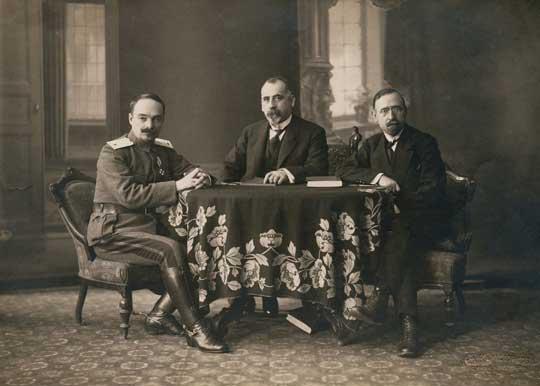Armistice Of Salonica on:
[Wikipedia]
[Google]
[Amazon]

 The Armistice of Salonica (also known as the Armistice of Thessalonica) was signed on 29 September 1918 between Bulgaria and the Allied Powers in Thessaloniki. The convention followed a request by the Bulgarian government for a ceasefire on 24 September.
The Armistice of Salonica (also known as the Armistice of Thessalonica) was signed on 29 September 1918 between Bulgaria and the Allied Powers in Thessaloniki. The convention followed a request by the Bulgarian government for a ceasefire on 24 September.

 The Armistice of Salonica (also known as the Armistice of Thessalonica) was signed on 29 September 1918 between Bulgaria and the Allied Powers in Thessaloniki. The convention followed a request by the Bulgarian government for a ceasefire on 24 September.
The Armistice of Salonica (also known as the Armistice of Thessalonica) was signed on 29 September 1918 between Bulgaria and the Allied Powers in Thessaloniki. The convention followed a request by the Bulgarian government for a ceasefire on 24 September.
Surrender
The armistice effectively ended Bulgaria's participation in World War I on the side of the Central Powers and came into effect on the Bulgarian Front at noon on 30 September. The armistice regulated the demobilization and the disarmament of the Bulgarian armed forces. The signatories were, for the Allies, French General Louis Franchet d'Espérey, commander of the Allied Army of the Orient, and a commission appointed by the Bulgarian government, which was composed of GeneralIvan Lukov
Ivan Tsonev Lukov ( bg, Иван Цонев Луков) (August 22, 1871 in Gabrovo – April 17, 1926 in Sofia) was a Bulgarian officer. During the First World War, he was Chief of Staff of the Bulgarian Army and commanded between 1917 and 1918 ...
(member of the Bulgarian Army headquarters), Andrey Lyapchev (cabinet member) and Simeon Radev (diplomat).
Its importance was described by German Emperor Wilhelm II in his telegram to Bulgarian Tsar Ferdinand I Ferdinand I or Fernando I may refer to:
People
* Ferdinand I of León, ''the Great'' (ca. 1000–1065, king from 1037)
* Ferdinand I of Portugal and the Algarve, ''the Handsome'' (1345–1383, king from 1367)
* Ferdinand I of Aragon and Sicily, '' ...
: "Disgraceful! 62,000 Serbs decided the war!"
On 29 September 1918, the Oberste Heeresleitung (German Supreme Army Command) informed Wilhelm and the German Chancellor, Count Georg von Hertling, that Germany's military situation was hopeless. On 14 October 1918, the Austro-Hungarian Empire
Austria-Hungary, often referred to as the Austro-Hungarian Empire,, the Dual Monarchy, or Austria, was a constitutional monarchy and great power in Central Europe between 1867 and 1918. It was formed with the Austro-Hungarian Compromise of ...
asked for an armistice, and on 15 October 1918 Turkish
Turkish may refer to:
*a Turkic language spoken by the Turks
* of or about Turkey
** Turkish language
*** Turkish alphabet
** Turkish people, a Turkic ethnic group and nation
*** Turkish citizen, a citizen of Turkey
*** Turkish communities and mi ...
Grand vizier
Grand vizier ( fa, وزيرِ اعظم, vazîr-i aʾzam; ota, صدر اعظم, sadr-ı aʾzam; tr, sadrazam) was the title of the effective head of government of many sovereign states in the Islamic world. The office of Grand Vizier was first ...
Ahmed Izzet Pasha sent a captured British general, Charles Vere Ferrers Townshend, to the Allies to seek terms for an armistice.
Terms
The terms called for the immediate demobilization of all Bulgarian military activities. It ordered the evacuation of Bulgarian-occupied Greek and Serbian territories, placed limits and restrictions to the size of Bulgaria's military employment and required Bulgaria to return military equipment that had been taken from the Greek Fourth Army Corps during the Bulgarian occupation of Eastern Macedonia in 1916. German and Austrian-Hungarian troops were to leave Bulgaria within four weeks. Bulgaria and especially Sofia were not to be occupied, but the Allies had the right to occupy some strategic points temporarily and to transfer troops over Bulgarian territory. According to Article 5, about 150,000 Bulgarian soldiers to the west of the Skopje meridian were to be delivered to the Entente as hostages. The French would send troops to Romania and the British and Greeks to European Turkey, which was still at war with the Allies. The armistice would remain in effect until the conclusion of the Treaty of Neuilly-sur-Seine, the final general peace treaty, in November 1919.References
Sources
* (1919) "Bulgaria Armistice Convention, September 29th, 1918". ''The American Journal of International Law Vol. 13 No.4 Supplement: Official Documents'', 402-404. *See also
* Battle of Dobro Pole * Serbian Campaign of World War I *Macedonian front
The Macedonian front, also known as the Salonica front (after Thessaloniki), was a military theatre of World War I formed as a result of an attempt by the Allied Powers to aid Serbia, in the autumn of 1915, against the combined attack of German ...
{{Authority control
1918 in Greece
World War I treaties
Bulgaria in World War I
Treaties concluded in 1918
Treaties entered into force in 1918
Treaties of the Kingdom of Bulgaria
Salonica
1918 in Bulgaria
Macedonian front
Treaties of the United Kingdom (1801–1922)
Modern history of the Balkans
Modern history of Thessaloniki
1918 establishments in Bulgaria
Bulgaria–France relations
Bulgaria–United Kingdom relations
September 1918 events